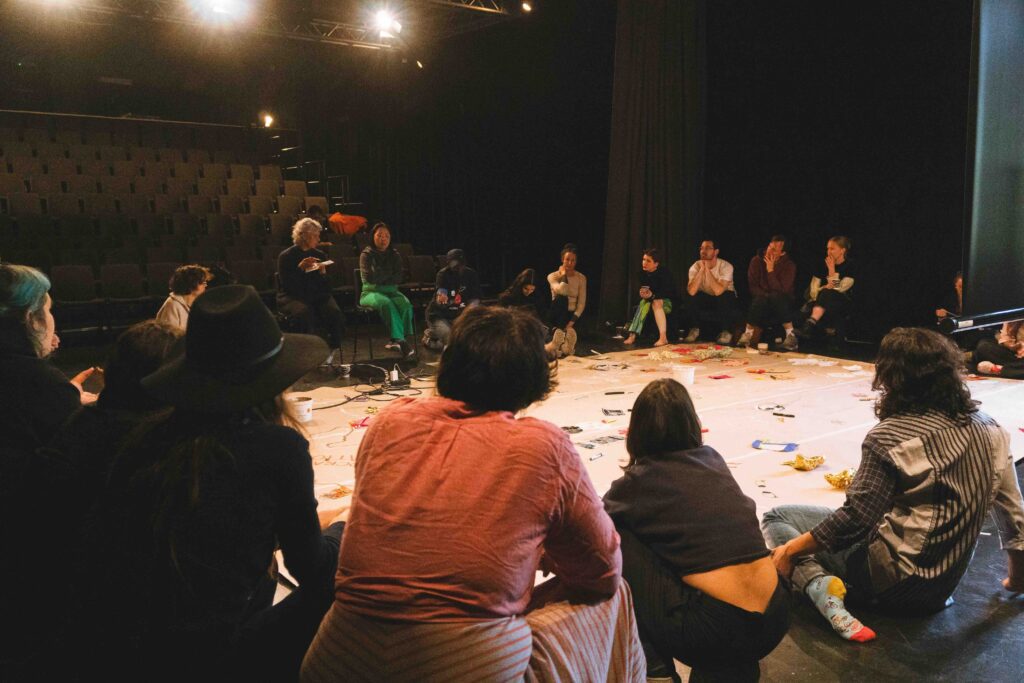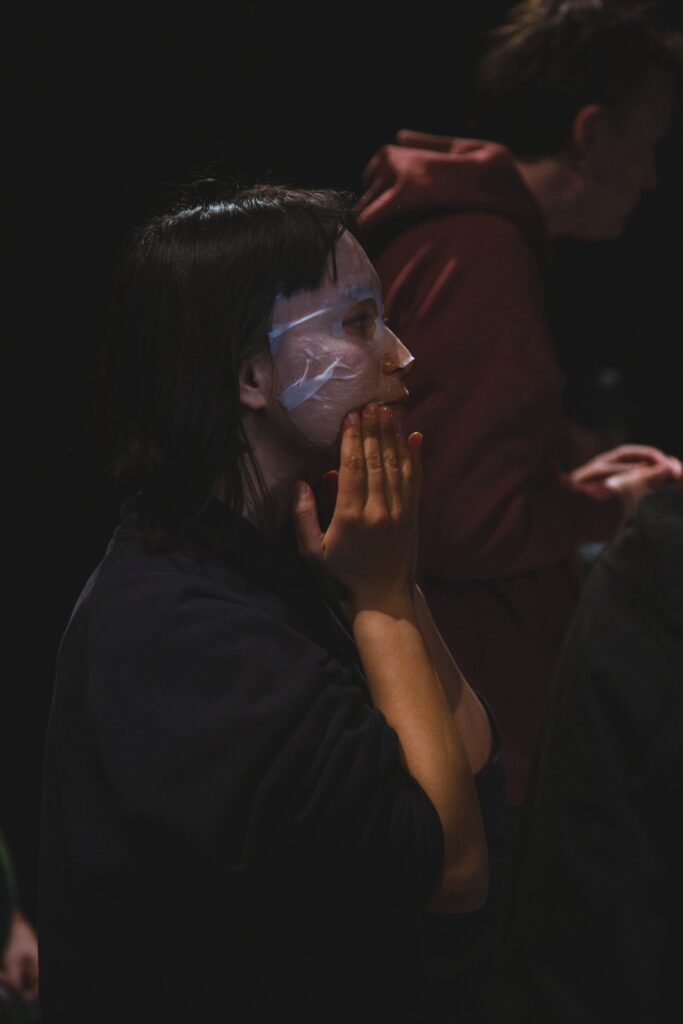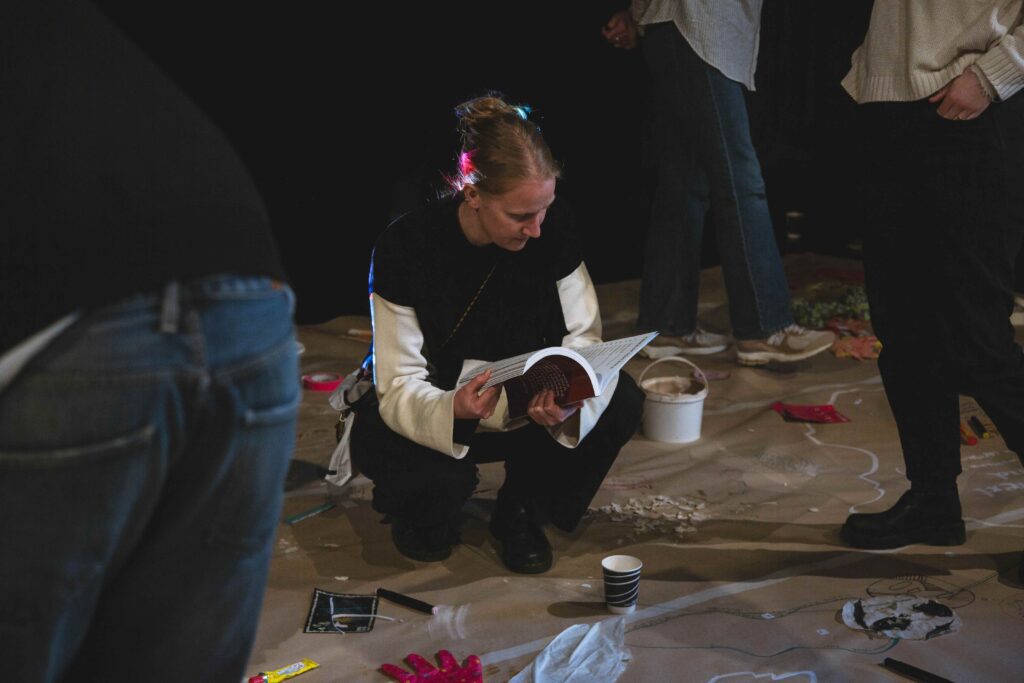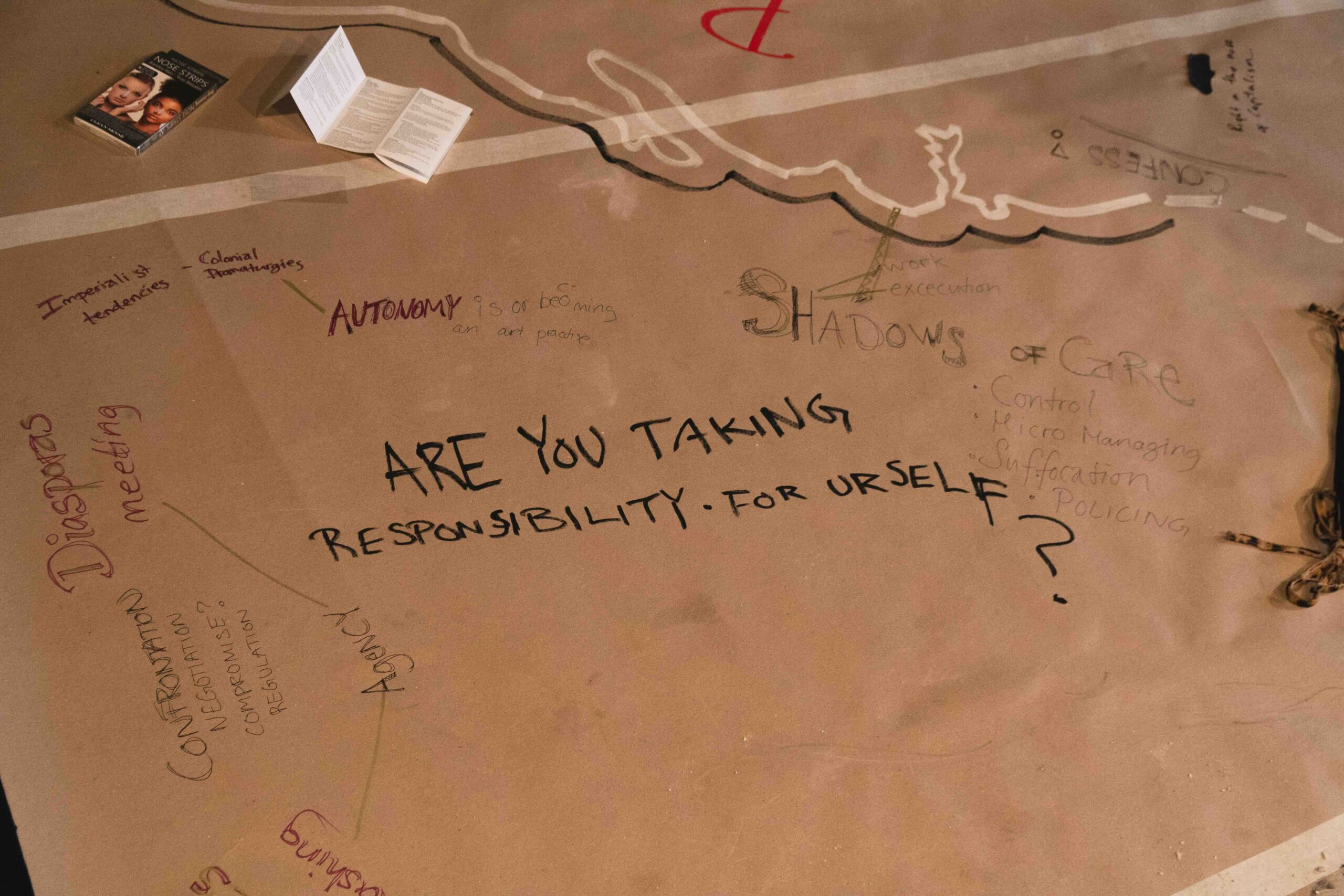care
noun, /keər/
the process of protecting someone or something and providing what that person or thing needs
Performance art has always seemed to me as some kind of care – a soft and sometimes firm touch or mark left on my skin.
From my seat, placed somewhere as audience, listener or critic, I often experience performance as one of the most caring and generous art forms. Not because performances necessarily are pleasant, but simply because the performers offer so much of themselves to us. Sometimes they even make us feel seen in a way rarely experienced outside of our private lives. At this HAUT-residency, after meeting the group of artists who generously invited us into their work, I am now thinking more and more about how we as audience or simply as citizens in turn should care for the artists.
In the weeklong residency Yi Ten Lai Fernández, Maria Naidu, Shahrzad Malekian, Louisa Yaa Aisin and David Sebastian Lopez Restrepo presented their artistic research on care described as:
“A research that stands in the context of our modern existence, where the concepts of care and sustainability have become persistent, often presented as an essential pursuit for personal well-being. In contemplating this contemporary phenomenon, the artists were inclined to reflect upon Hannah Arendt’s philosophical insights, particularly her exploration of the ‘banality of evil’ in the context of the Eichmann trial. Applying Arendt’s analytical lens to care and sustainability, unveiled to them intriguing parallels, prompting them to contemplate the banality of those concepts.”
As both artists and body researchers, the group researches different ways to enhance our experiences of care and sustainability.

The worksharing The Banality of Care – A Physical Dialogue About the Common Trivialization of Care and Sustainability took place the 21st of April at Teater Zeppelin. A few days before, I met the group in the black box, but mostly for coffee and a chat in the canteen.
This is an attempt at collecting their thoughts, observations, outbursts, broken sentences, doubts and pauses as equally important fragments.
» Is care happening at the same time as we talk about it?
I reflect on my academic frame and sometimes it doesn’t apply to the real world.
Structures of power underneath our behaviours are fighting back and forth constantly by making coffee, placing a camera or an audio recorder.
It has become a social experiment related to constellations, diasporas and agency.
An approach with no plans.
Forces colliding has become part of this power game.
This is also about egos. These masks of individualism, weapons and strategies, even though we work as collectives and for long periods of time are working together, having the same mission with mutual understanding for each other… but collectives can collapse, members can leave.
To approach the topic of care and sustainability from the physical side by shopping for care products and merging the capitalistic systems into care logics is playing the same game as capitalism which is consumerism.
Everything is so personal, I think.
Traumas filter our personal experiences and imprint our work.
We were talking for two days.
A memory of cultural heritage.
This mask was really frustrating, but then there was this space of like nothing was really happening. We listened to this podcast, maybe we didn’t like it, about how this artist deals with diversity and care in the art scene…
Is it sustainable if we have to rebuild the social relations every time or is it just exhausting?
Care is labour. You have to work to listen, show empathy… this is mental labour and physical labour… and if you do this, it is also sustainable to keep the collaboration.
How resting always leads to work.
Everything has to do with everything so even this loopy thought pattern has to do with self care.
Applications and the care system exist basically to allow us to be more productive.
To resist the care system.
Grants for artists are also a structure designed for us to work.
Maybe there is some place in the world where you actually don’t need money.
Do you remember the artist who ran away with the money, delivering an empty canvas?
The gesture of emptiness is very important. Emptiness is so full of content.
I would rather hear you talk about Thoreau than read him.
I realised I had expectations I didn’t know. Now I am doing my best at finding out what the angle is, but it takes a lot of energy. I’m hoping I can let that go.
I am interested in the body. For me that’s the way of healing.
To care for my body, I need time and time is still money. It becomes a catch-22. I have to work beyond the point of exhaustion to allow myself to get the income to take the time off… It becomes this infinity symbol.
The only way of getting out is to leave the arts.
You were laying on the floor saying ‘I don’t feel like talking anymore’.
I just want to communicate with my body. Our society is so verbal, intellectual, and I think dancing relates to a deeper place in the brain, here.
I also feel like, oh, I don’t want to talk. I just want to be quiet and maybe make sounds.
I realised how tired I am of this hyper awareness of the different discourses.
Historically this practice of care has been a female task. The mother as body and earth. Always these binaries. The man as reason and thought.
Reason dominated the senses.
Still, we use the mind to decolonize the mind from the body.
Normative choreographies are supposed to be for our own safety. But in reality, they are suppressing our authenticity and ability to self regulate. Self regulating is based upon autonomy and sensing your own knowledge and not being afraid of yourself.
We’ll get vegan food for everybody, but actually it is rarely that I like vegan food. I am always hungry.
By caring for the other you are hurting yourself.
Never knowing the true meaning of feeling overwhelmed.
The privilege to feel, to actually feel, to embody value. That’s a privilege beyond money.
In the name of care.
No, you’re gonna study and you’re going to become a doctor.
I was curious about the word banality and unoriginality and how care can become control.
I got a fine the other day, but they say it’s for my own safety: ‘We care for you’.
How others should take responsibility for me is bullshit because they are not me.
When we feel our own senses, we feel the room and other people too.
So much plastic!
Repeating a lie.
Rituals do have purpose.
We were working 10 to 5.
Just to scratch the surface.
One week.
At the same time a week has a lot of potential.
It’s just for the record.
Let them speak!
I’m actually feeling this mask. Put intention into it – «

Thinking about how care should never be earned, I enter a stage a couple of days later.
On the stage we find a huge amount of care products: face masks, hand masks, foot masks, a bucket of clay. A lot of handwritten notes and a massage table. People can come and go, try all the products, and read the group’s notes covering the floor.
There is fruit, wine, chocolate and knækbrød, and then a video recording of their research. A video displayed and framed by the editing software.
In the video the artists are shopping for care products, zooming in on products from skin care to vibrators in a convenience store. They sweep the stage clean, dip their hands in a jar of coconut oil, apply face masks and roll the sheet of paper across the stage floor. They line dance and read a bit. They do karate with knækbrød and yoga.
They edit the video as it is shown, and a circle is rhythmically drawn with dried clay scraps by an artist on the floor.
‘Care’ is now integrated in this relaxed choreography taking place in the black box. Also, in relation to the audience, who are given the opportunity to access the worksharing on their own terms, to come and go. The audience is walking around chatting on the stage, a complex map of materials, searching for lost and then found details, that special detail: ‘I’m glad, I found it’, ‘I’m so glad you found it’.

At the same time, this is a vulnerable space. Suddenly, you find yourself in the spotlight on stage. In general, I would never think of a black box as a particularly caring kind of space. But this artist group is able to bring the mood right down to earth. I feel like taking a deep breath and some audiences sit down and talk gently while testing the care products.
I am walking between the objects on the stage thinking about the group’s thoughts as they were presented in their conversation, but there is something less philosophical at play here. Something direct and active.
Openness & Trust
Yes / Okay / No
Honesty
Kindness
No expectations
Space to rest
I read their notes, keywords and attempt at a guideline for a good collaboration and especially greater notions on care and society on the floor, but here a tiredness also spreads in my body: Would it feel better to wear one of these face masks just to hide my face for a while?
In this work sharing the performers are almost on an equal footing with the audience. Or they are a wonderful kind of lazy hosts while we are some shy guests. But I also get the feeling that they are trying to implement the thoughts about work and care that I heard them share just a few days ago. They have given so much of themselves in conversations and video recordings, by dancing and hosting. Maybe they have finally found some rest? Now, the artists seem to be resting in this loose choreography by reading a book in the audience row, practising self care in different shapes, but caring for the audience too. Chatting and offering food and wine. Sleeping and behaving ritually.
Project initiated by Performance Køkkenet
Artists: Yi Ten Lai Fernández, Maria Naidu, Shahrzad Malekian, Louisa Yaa Aisin and David Sebastian Lopez Restrepo.
IN PROCESS is HAUT’s one week residency format that makes space for physical brainstorms supporting the investigation and the development of new ideas for the stage.
Yi Ten Lai Fernández, Maria Naidu, Shahrzad Malekian, Louisa Yaa Aisin and David Sebastian Lopez Restrepo have been invited into this residency through the open call ‘IN PROCESS – Care’, which focuses on the investigation of sustainability, care, self-care and alternative working methods and processes. The open call was curated in collaboration with Yong Sun Gullach.
This residency is supported by The Danish Arts Foundation, The Bikuben Foundation and the Municipality of Copenhagen.
More from Sandra Cecilie Quist
